Whether you want to get back to your roots or just be prepared, learning how to raise chickens for eggs is an awesome experience for kids & adults!

There is something grounding about caring for chickens and reaping the rewards… Fresh eggs daily! But there are so many more reasons to raising chickens for eggs!
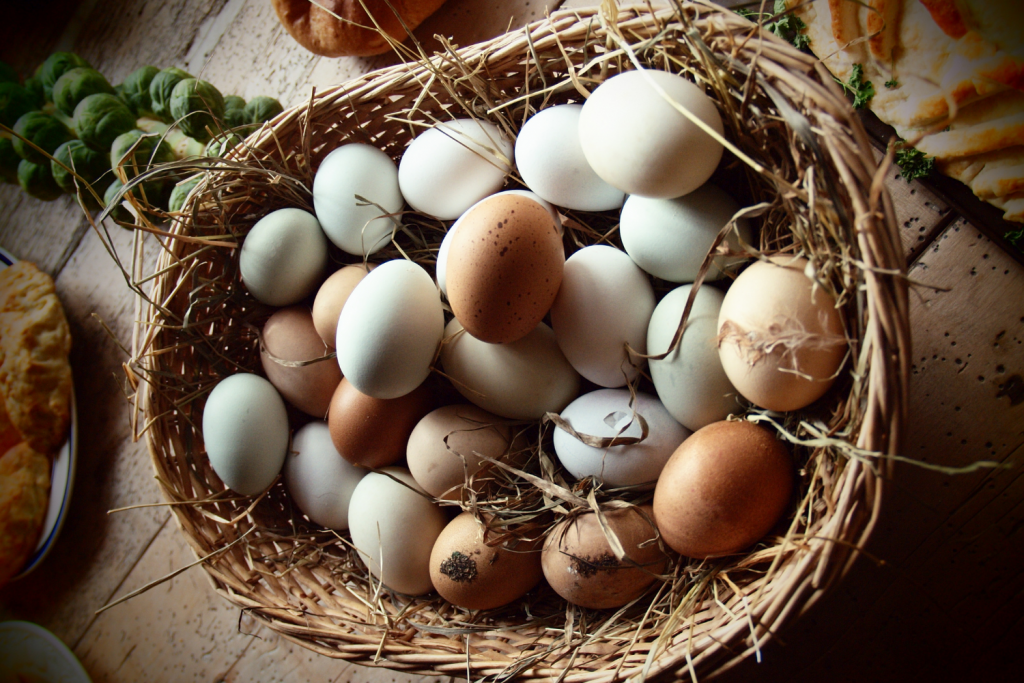
Raising Chickens For Eggs
Here are some of the perks you get from having your own egg-laying flock:
- Fresh Eggs (And they’re pretty too!)
- It’s a fun way to show kids where their breakfast comes from!
- You get the best fertilizer from your chickens!
- Chickens you out into the yard daily.
- They are FUN pets!
- Chickens are entertaining to watch.
- Chickens love to eat bugs and weeds!
- Watch eggs being laid.
- Recycling… You won’t waste leftover food or cooking scraps anymore, because chickens LOVE them!
- Chickens are pretty easy to care for.
- You can even raise some chickens for delicious, homegrown meat. But that’s a whole other adventure for another day!
Raise chickens for eggs the easy way by getting everything prepared first!
Before your start raising chickens for eggs, you need to choose the best spot in your yard for a coop!
Sunlight & Shade… Try to find a spot that gets sunshine and has shade, so chickens will be able to be comfortable whatever the weather! If you don’t have a shady area, you can cover half their coop for shade.
If you have an abundance of shade, and not much sunshine, trim up a tree to give a little sunshine to the area.
Noise…. If chickens get upset or stressed, their egg-laying rhythm gets knocked out of order, and they won’t lay for a day or two. Laying chickens do best in areas that are quieter, so try to keep it away from the road, dogs, and any other source of noise and commotion.
Fresh grass… Chickens LOVE to forage for bugs, worms, and grubs all day long, so try to find a spot where there is grass under the coop yard!
Pick or Build A Chicken Coop
Before you pick a coop, you need to decide on how big of a chicken flock you want! If you are just starting out, I suggest starting with a handful of chickens till you get the hang of it all.
Getting 10+ chickens from the get go may be a little overwhelming for your first year… Then again, chickens are pretty easy to care for, so totally up to you!
Chickens don’t require much in square footage! In fact, they LOVE to share the nesting box! Even if you have 30 chickens, they may only use 1-2 nesting boxes… Even if you have 10! In fact, chickens only need 1-2 square feet of coop space each.
If you are building a coop, you can find coop plans or ideas all over online.
Chicken Run or Yard Size
Chicken runs are the yard outside a chicken coop, where chickens can forage during the day! Chickens need a bit more space in the chicken run/yard than they do in the coop. The general rule is 8-10 sq ft of a yard per chicken. 8-10 sq ft per chicken is enough space for chickens to forage.
If You are planning on raising free-range chickens (their diet is mostly bugs, worms, and grubs from the land) you’ll need 200-300 sq ft per chicken.
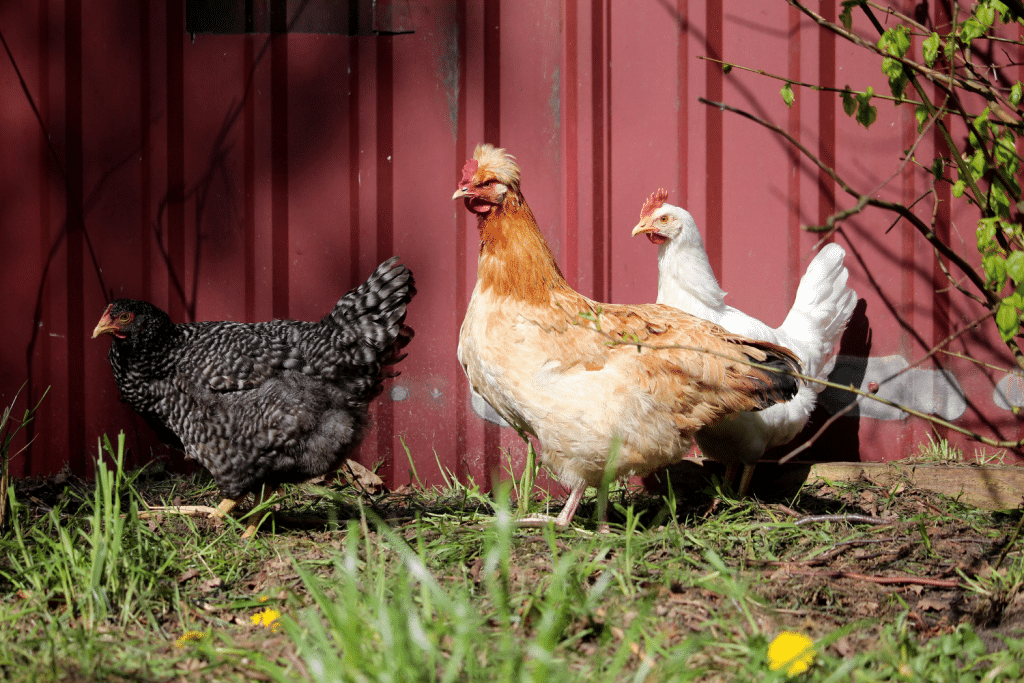
Many people with smaller yards, just have a coop and let chickens run free in the yard during the day… The only thing I don’t like about this method (from my own experience) is that they POOP everywhere.
Chicken poop is AWESOME for the grass, BUT not so awesome for your kid’s shoes (or bare feet!) So, do what is best for your situation!
How To Raise Chickens The Easy Way with Chicken Feeders & Waterers
Chickens do best with food & water always available, and this is easy to provide with a hanging feeder and waterer.
The new style chicken feeder is designed so chickens can’t jump on on the feeder and poop in their food, as they did with older style chicken feeders. This feeder also keeps chicken food clean, and allows for way less waste, because chickens can’t scatter their food like they do with open feeders!
The chicken waterer below has nipples so that chickens can’t get up on the waterer and poop in their water like they do with older style waterers. These keep the water clean, so you don’t need to change the water as often!
Chicken Grit
Chickens digest their food differently than other animals. They have a gizzard where food is stored and broken down by little rocks that chicks actually eat. Without GRIT, chickens will not properly digest their food, and egg production can go down.
You can either keep adding grit to your chicken feeder, or You will need a little pan for chicken grit to keep in the coup!
If you plan on free-ranging your chickens, they may get enough grit in their diet naturally, but I have had problems even free ranging and had to add grit to their diet. The best practice is to make grit available to chickens regularly.

Print Card
How To Raise Chickens for Eggs
Equipment
- Tools for building coop unless you buy one premade.
- Chicken feeder & pellet food
- Waterer & water
Materials
- Chicken Coop
- Chicken Yard
- Chicks
- Brooder
- Warming Light
- Medicated Starter Crumbles Chick Food
- Feeder
- Waterer
- Nesting Box
- Grit
Instructions
- Buy or Build Your Coop and fenced chicken yard.
- Buy or Build a Brooding Box (can be wood or cardboard.
- Place your warming light about 1 foot above the brooder
- Cover the floor of the brooder with pine shavings
- Place chicks in the brooder
- Add feeder with food
- Add waterer
- Feed and water daily
- Changer pine shavings weekly
- After chicks get feathers, move them to the coop.
- Cover the floor and nesting boxes of the coop with pine shavings and change twice a month.
- Hang a Feeder and Waterer and refill them every few days.
- After 4-5 months start collecting eggs each day!
Brooding Box
When you first bring chicks home, they are super little and don’t have feathers to keep them warm yet. They just have the CUTE chick fluff and need a warm place to grow for a few weeks till their feathers come in…
You can build a brooding box by cutting down (making shorter) a large cardboard box, and adding a heat lamp with a heat bulb suspended up a bit higher.
If you are planning on getting new chicks every year, you can simply order a nice brooding box that will last here:
***Keep your chicks in their brooding box inside the house or garage to protect them from the rain, cold weather, and predators!***
Supplies To Buy Before You Get Chicks
Before you bring your chicks home, you will also need a few special supplies. These can all be ordered on Amazon, or picked up at your local Farm Supply:
- Crumble Chick Feed
- A Chick Feeder
- A Chick Waterer
- Save A Chick Chick Drink Mix (Special vitamin mix for chick water)
- Pine Shavings for the bottom of brooder and coop.
Buying Chicks
This is the exciting part… Now that you are all set up with a brooding box, food, feeders, waterers, and a coop…. It’s TIME to get your chicks!
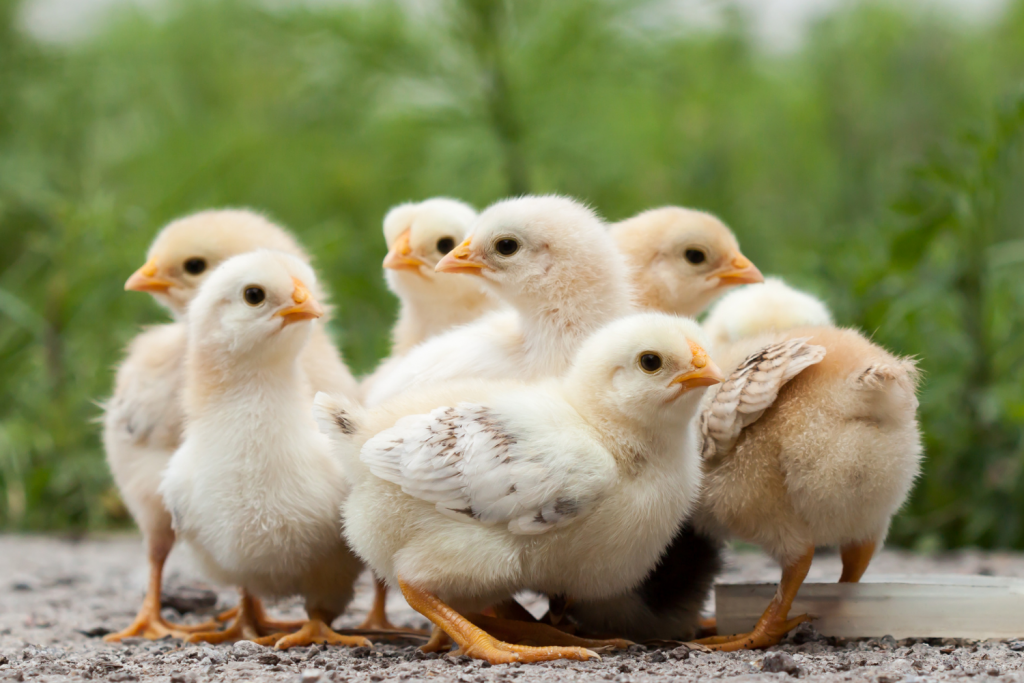
Before you purchase chicks… Think about what kind of chickens, and eggs you want!!!
Americana chickens lay green eggs, bantam chickens are miniature in size and lay mini eggs, White Leghors lay the most eggs in a year. Do a little looking around and decide what kind of chickens you’re going to get!
I LOVE the unique chicken breeds that are different and beautiful. I also LOVE a variety of colors in chicken EGGS!
When you know what kind of chickens you want, order them!
I buy baby chicks from the local Dunlaps Hatchery and our local farm and garden supply store. You can also order chicks ONLINE here.
When Your Chicks Get Home
- As soon as your chicks get home, put them in their brooder.
- LINE THE BOTTOM with PINE SHAVINGS.
- Place the chick crumble food into the feeder.
- Place feeder in the brooder.
- Fill chicken waterer with water and add save a chick drink mix.
- Place the waterer in the brooder.
Make sure to add water and food as needed, and change pine shavings at least once a week.
How Long Do Chicks Stay In Brooder?
Keep your in their brooder till they get their feathers. Once chicks have feathers (6-10 weeks), and it’s warm enough outside, they can be moved to the coop!
Make sure to prep your coop like the brooder:
- Spread fresh pine shavings, or clean straw, on the coop floor.
- Fill and hang the feeder.
- Fill and hang waterer.
- Place Chicken Grit pan where chickens can get it.
- Hang the heat lamp in the coop for a couple more weeks, especially if it’s cold.
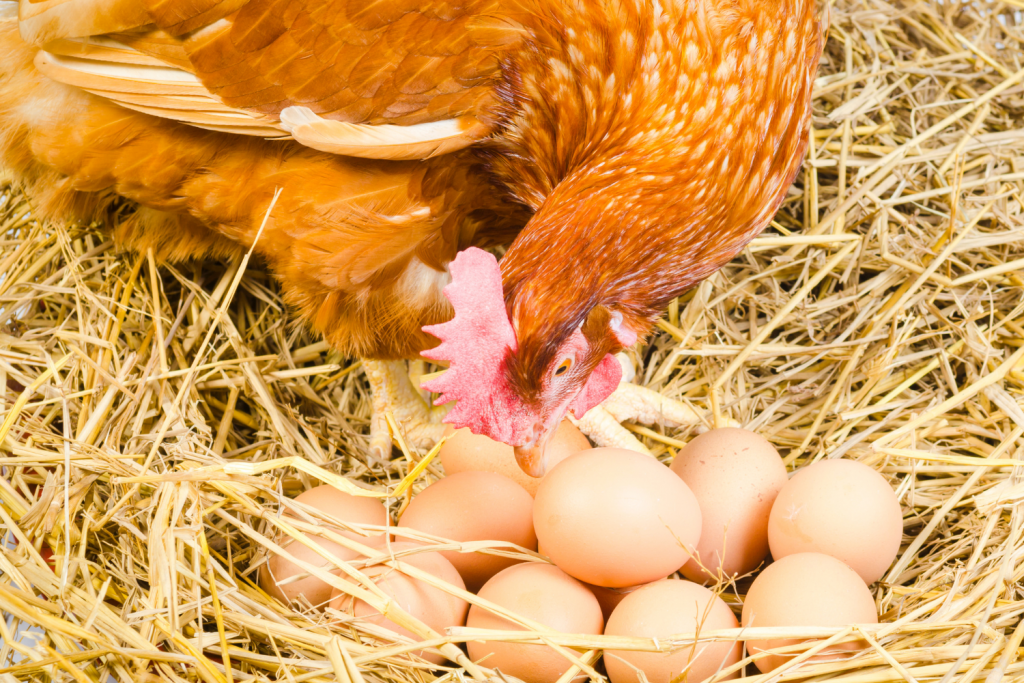
Chicken Chores
Chickens don’t require much… Daily chores include:
- Make sure there’s food in the Feeder
- Make sure there’s water in the Waterer.
- Gather eggs daily.
Gather eggs daily! If you leave eggs in the coop, they can develop into chicks (if you have a rooster) or the hens may start pecking and eating eggs.
If you find a broken egg in the nesting box, get some wooden eggs or golf balls, and put them into the nesting boxes. These wood eggs teach hens not to peck or eat eggs.
Sometimes chicken feathers get dirty around their egg shoot… (Their bum.) If you notice a dirty bum, put your gloves on and give your hen a little bath. Make sure she’s dry before putting her back into the coop.
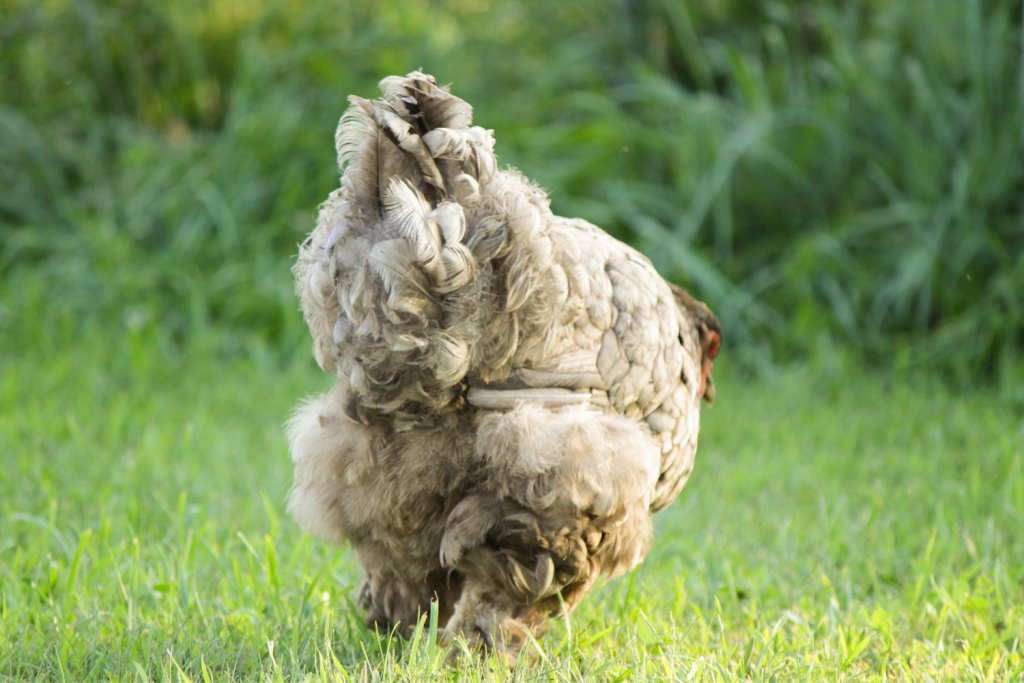
Cleaning The Coop
Clean your chicken coop twice a month by removing old pine shavings and poop, and spreading fresh pine shavings, or fresh straw, on the floor and in nesting boxes.
Then spray the coop… Spray chickens or coop with Poultry Spray every other week to PREVENT mites, fleas & ticks from pestering them!
You may also enjoy











7 comments
Kathy
do you worry about predators coming into the cage? like snakes? Do you bury chicken wire in the floor of the coop to prevent moles and gophers?
Sierra
Love these suggestions! So helpful! We love our chickens!
Michelle
Wow!! I’ve been wanting chickens for a while but was super intimidated at the thought of how much work it would be. This helped me feel better about it!! Thanks for the post!
Julie
This is an awesome resource! We can’t currently keep chickens due to our cities ordinances, but one day we will move and I hope to have a coop of our own.
Emily
Great blog! Love our chicken, they make the best pets.
Susan
Great post!! I’m going to start my chicken keeping adventure in about a month or so… a bit nervous but excited too! This was super helpful. Thanks.
Abi
I just love chicken posts! Thank you for these tips!